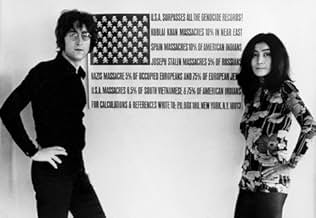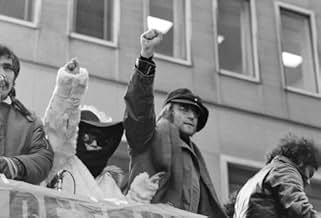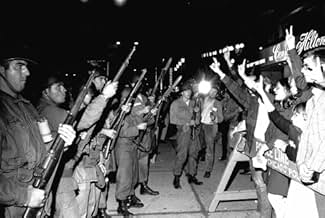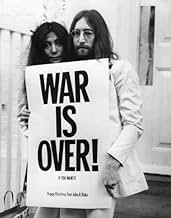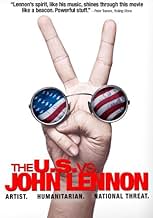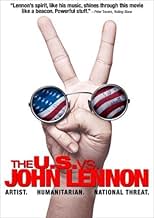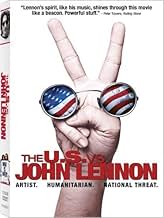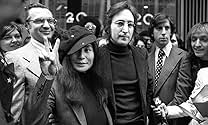IMDb RATING
7.3/10
5.7K
YOUR RATING
A documentary on the life of John Lennon, with a focus on the time in his life when he transformed from a musician into an antiwar activist.A documentary on the life of John Lennon, with a focus on the time in his life when he transformed from a musician into an antiwar activist.A documentary on the life of John Lennon, with a focus on the time in his life when he transformed from a musician into an antiwar activist.
- Directors
- Writers
- Stars
- Awards
- 2 nominations total
John Lennon
- Self
- (archive footage)
- Directors
- Writers
- All cast & crew
- Production, box office & more at IMDbPro
Featured reviews
"Imagine no possessions, I wonder if you can. No need for greed or hunger. A brotherhood of man. Imagine all the people, Sharing all the world. You may say I'm a dreamer. But I'm not the only one. I hope someday you'll join us. And the world will live as one." John Lennon, "Imagine" "All we are saying, Is give peace a chance." John Lennon, Give Peace a Chance I can't help hearing the song "Imagine" and feeling a little teary-eyed. I still remember being part of the worldwide vigil after John Lennon's murder and hearing the idealistic song, depicting a vision at that time suddenly sounding cruelly out-of-reach. The Beatles is one of those very few groups that seems to enjoy near-universal appreciation, from folks in their teens through those in retirement, including classical music aficionados as well as heavy metal enthusiasts. The songwriting power behind the group was primarily the genius of John Lennon and Paul McCartney, both of whom continued on to successful, creative solo careers.
With that background, how could I not jump at the opportunity to see a film about John Lennon? "The U.S. vs. John Lennon" is a documentary about the life of Lennon, specifically focusing on his peace activism during the Vietnam War era. I was certainly aware of his political engagement and songs such as "Give Peace a Chance", "Power to the People", and "Happy Christmas (War Is Over)". And I vaguely recall that there were some immigration issues that this English man faced in America. But I was not fully aware of, or perhaps forgot, how strongly the Nixon administration sought to deport John Lennon simply based on his views and activism.
The film moved at a very appropriate pace, introducing enough biography to help better understand the germane issues, quickly going through John's childhood, involvement with the Beatles, and marriage to his wife Yoko Ono. Consummate musician, John is quoted as saying that all that he really wanted to do was to make music. But the escalating violence in Vietnam made him an outspoken critic of the war. A master of publicity, he even turned what he knew would be dogged press during his honeymoon to his advantage by staging a well covered love-in for peace urging love and not war.
Richard Nixon held the office of President of the United States from 1969-1974 and is the only President to have resigned, facing impeachment for the "Watergate" scandal and clear abuse of power. In spite of election promises, Nixon plunged the country into deeper war with Vietnam amidst growing public outcry.
With the help of the heavy-handed J. Edgar Hoover, Director of the Federal Bureau of Investigation for almost fifty years (from 1924 until his death in 1972), the Nixon administration sought to silence some in the anti-war movement. It tried to deport John Lennon and, finding that he had a small charge of marijuana possession filed back in England earlier, used that as a pretext to demand his departure.
Eventually, Lennon's lawyer countersued and proved that the Nixon administration has conspired against him, with people from the very top of the government involved. Lennon won and was granted permanent immigration status to allow him to stay in New York, the city he loved. Unfortunately, in 1980, John Lennon was gunned down outside of his New York apartment by a deluded fan.
"The U.S. vs. John Lennon" is a moving film about a person larger than reality as if being a prolific and well-recognized songwriter weren't enough, he was a singer, guitarist, author, and political leader who embodied nonviolence and peace, influenced by Gandhi and he was very influential in each of these areas. Many would say that Lennon was one of the key spokespersons of the generation that came of age in the 1960s, and offered a vision of a world united by zest for living together and not divided by petty differences. It is also a film about how unchecked power can try to wield unfair influence in attacking its perceived enemies.
A vivid history lesson accompanied by many brilliant songs of John Lennon's, I highly recommend "The U.S. vs. John Lennon" to all (note that it is rated PG-13 for some "strong language, violent images and drug references" but I wonder if that is a little overstated). Viewers will (re)learn important biographical and historical aspects of the man and times, and, more importantly, see John Lennon's message for its universality and timelessness. The music alone will likely rekindle or begin new memories, and the documentary is a fascinating review of an important era in recent history.
8 stars out of 10
--Dilip Barman, Durham, NC
With that background, how could I not jump at the opportunity to see a film about John Lennon? "The U.S. vs. John Lennon" is a documentary about the life of Lennon, specifically focusing on his peace activism during the Vietnam War era. I was certainly aware of his political engagement and songs such as "Give Peace a Chance", "Power to the People", and "Happy Christmas (War Is Over)". And I vaguely recall that there were some immigration issues that this English man faced in America. But I was not fully aware of, or perhaps forgot, how strongly the Nixon administration sought to deport John Lennon simply based on his views and activism.
The film moved at a very appropriate pace, introducing enough biography to help better understand the germane issues, quickly going through John's childhood, involvement with the Beatles, and marriage to his wife Yoko Ono. Consummate musician, John is quoted as saying that all that he really wanted to do was to make music. But the escalating violence in Vietnam made him an outspoken critic of the war. A master of publicity, he even turned what he knew would be dogged press during his honeymoon to his advantage by staging a well covered love-in for peace urging love and not war.
Richard Nixon held the office of President of the United States from 1969-1974 and is the only President to have resigned, facing impeachment for the "Watergate" scandal and clear abuse of power. In spite of election promises, Nixon plunged the country into deeper war with Vietnam amidst growing public outcry.
With the help of the heavy-handed J. Edgar Hoover, Director of the Federal Bureau of Investigation for almost fifty years (from 1924 until his death in 1972), the Nixon administration sought to silence some in the anti-war movement. It tried to deport John Lennon and, finding that he had a small charge of marijuana possession filed back in England earlier, used that as a pretext to demand his departure.
Eventually, Lennon's lawyer countersued and proved that the Nixon administration has conspired against him, with people from the very top of the government involved. Lennon won and was granted permanent immigration status to allow him to stay in New York, the city he loved. Unfortunately, in 1980, John Lennon was gunned down outside of his New York apartment by a deluded fan.
"The U.S. vs. John Lennon" is a moving film about a person larger than reality as if being a prolific and well-recognized songwriter weren't enough, he was a singer, guitarist, author, and political leader who embodied nonviolence and peace, influenced by Gandhi and he was very influential in each of these areas. Many would say that Lennon was one of the key spokespersons of the generation that came of age in the 1960s, and offered a vision of a world united by zest for living together and not divided by petty differences. It is also a film about how unchecked power can try to wield unfair influence in attacking its perceived enemies.
A vivid history lesson accompanied by many brilliant songs of John Lennon's, I highly recommend "The U.S. vs. John Lennon" to all (note that it is rated PG-13 for some "strong language, violent images and drug references" but I wonder if that is a little overstated). Viewers will (re)learn important biographical and historical aspects of the man and times, and, more importantly, see John Lennon's message for its universality and timelessness. The music alone will likely rekindle or begin new memories, and the documentary is a fascinating review of an important era in recent history.
8 stars out of 10
--Dilip Barman, Durham, NC
I was in high school in 1980 when John Lennon was assassinated and all I really knew about him was that he was a musician and a member of the Beatles. I found this documentary fascinating, which gave an excellent insight into Lennon's participation in and effect on the anti-war movement in the US during the Vietnam War. I came away with a greater respect of the man and what he tried to do along with with his wife and the pressures they faced from the US government who wanted to silence them. Although some parts were something of a rehash about the anti-war movement in general, the skillful editing along with use of numerous interviews and recorded material still made it enjoyable and informative. One can not help but draw a comparison between this film and message and the on-going debate over the Iraq war, which I suspect was one of the goals of those who made it. I saw this film at a suburban Washington DC theater this weekend, and when one of the interviewees said "John Lennon represented light, and Mr. Nixon and Mr. Bush represented death" at least half the audience clapped. I guess it made its point to this audience. If you get a chance to see it, I highly recommend it.
For those who are too young to remember the real John Winston Ono Lennon -- this film is a good introduction to why he mattered so, why so many people were (and are) devoted to him as an artist and a man, why he was truly the most original voice of his generation.
The film is not perfect -- but in its defense, it covers an extraordinary amount of material and does it well.
Lennon lived 100 lifetimes between 1969 and 1975.
This film concentrates on the biggest conflict he faced at that time: his struggles to remain in the US, and the right-wing paranoia (exemplified by FBI director J Edgar Hoover and Nixon's hatchet man, John Ehrlichman.)
Lennon's sincerity, his naiveté, his charisma shine throughout.
Yoko has been attacked (so what else is new) for being such a strong presence in the film but she was right there beside him. They lived it all together. And she does not use her camera time to diminish him in any way.
Strong recommendation -- primarily because we have to remind ourselves that there are times to speak up and times to act.
John Lennon: we miss you so.
The film is not perfect -- but in its defense, it covers an extraordinary amount of material and does it well.
Lennon lived 100 lifetimes between 1969 and 1975.
This film concentrates on the biggest conflict he faced at that time: his struggles to remain in the US, and the right-wing paranoia (exemplified by FBI director J Edgar Hoover and Nixon's hatchet man, John Ehrlichman.)
Lennon's sincerity, his naiveté, his charisma shine throughout.
Yoko has been attacked (so what else is new) for being such a strong presence in the film but she was right there beside him. They lived it all together. And she does not use her camera time to diminish him in any way.
Strong recommendation -- primarily because we have to remind ourselves that there are times to speak up and times to act.
John Lennon: we miss you so.
I am too young to really remember John Lennon being alive and what I know of him is mostly based around the Beatles and his later solo efforts which, in my view, saw him becoming a bit of a peacenik under the influence of Yoko Ono. As a result this film sat on my recorder for quite a few weeks before I got round to watching it but I am glad I did because it is actually a very interesting film that is pitched perfectly to inform viewers such as myself who perhaps did not know anything about John Lennon in the latter stages of his life.
It goes without saying that the film is sympathetic to Lennon and what he was trying to do and I suppose this is a fault within the telling that the bias towards him as a person is inherently there. This will put off some viewers who simply disagree with him, draw in those that agree but to the casual viewer I doubt it will come over as a problem and indeed for me it was just something I observed rather than something that was an issue. Anyway, what the film did well for me was to acknowledge that Lennon was an artist and a peacenik but to move him beyond the images and songs that we all know. This gives him as a person more of a foundation and meaning because, viewed in context of his time he actually comes over as a key figure and an intelligent man (albeit an artist!).
I'm sure some will see this as a problem because they disagree with it but the approach works. Setting the foundation and showing Lennon speaking out (in his own way) builds well to make the later persecution by Nixon's Whitehouse to be a natural progression and believable rather than being a rather sensationalist newspaper headline (or indeed like the title of the film itself). The use of archive footage is really well done as it makes rightly makes Lennon the main character while the contributions are mostly relevant and edited into the main flow well.
An interesting and engaging documentary that sits as a fitting tribute to who John Lennon was, even if it focuses on a specific period in his life. Understandably slanted to the left politically, it will appeal to the casual viewer quite easily.
It goes without saying that the film is sympathetic to Lennon and what he was trying to do and I suppose this is a fault within the telling that the bias towards him as a person is inherently there. This will put off some viewers who simply disagree with him, draw in those that agree but to the casual viewer I doubt it will come over as a problem and indeed for me it was just something I observed rather than something that was an issue. Anyway, what the film did well for me was to acknowledge that Lennon was an artist and a peacenik but to move him beyond the images and songs that we all know. This gives him as a person more of a foundation and meaning because, viewed in context of his time he actually comes over as a key figure and an intelligent man (albeit an artist!).
I'm sure some will see this as a problem because they disagree with it but the approach works. Setting the foundation and showing Lennon speaking out (in his own way) builds well to make the later persecution by Nixon's Whitehouse to be a natural progression and believable rather than being a rather sensationalist newspaper headline (or indeed like the title of the film itself). The use of archive footage is really well done as it makes rightly makes Lennon the main character while the contributions are mostly relevant and edited into the main flow well.
An interesting and engaging documentary that sits as a fitting tribute to who John Lennon was, even if it focuses on a specific period in his life. Understandably slanted to the left politically, it will appeal to the casual viewer quite easily.
STAR RATING: ***** Saturday Night **** Friday Night *** Friday Morning ** Sunday Night * Monday Morning
During the 1960s, John Lennon was one part of The Beatles, still almost certainly the most successful British band today. But it was also the time of the Vietnam war and of the 'flower power' generation, which he got very much caught up in, much to the furore of the Nixon administration. This film follows John's escapades during this time, from his peace activist activities, his romance with conceptual artist Yoko Ono who showed him some far-out methods of drawing attention to his cause, his 'stay in bed' crusade after the failure of flower power, his support of the Black Panthers, his far out views on materialism and spirituality and, of course, the Nixon administration's paranoia about his influence on the youth of America at the time, which lead to them tapping his phone and having him followed and, eventually, attempting to get him deported on a bullsh!t possession of marijuanna charge.
Although many of Nixon's worries concerning Lennon were probably a load of hot air, it's doubtless the huge role the man played in inspiring a generation of young people to adopt the ideals of peace and love for your fellow man, which the Nixon administration, hell-bent on sending many young men off to die for a cause they didn't understand let alone believe in, was understandably rattled about. And so it's an interesting idea to make a documentary like this, highlighting the huge influence the man had and the increasingly drastic steps that were taken to try and put a dent in it. Talking heads include figures from the FBI, those caught up in the peace demonstrations, a platoon leader in Vietnam as well as Yoko Ono herself and the then leader of the Black Panthers. It all makes for a very interesting and revealing expose of events involving Lennon at the time, and it all plays out in much this way too. The one problem is that it veers off course from the source material at the time in some parts, leaving the theme of Nixon's harassment of Lennon and playing more like your typical biography of Lennon's life and, in turn, becomes a little meandering and boring, especially towards the end.
Nonetheless, it certainly doesn't fail as a documentary and still maintains an interesting and relevant theme through-out that Lennon enthusiasts and others as well will be very interested in seeing. ***
During the 1960s, John Lennon was one part of The Beatles, still almost certainly the most successful British band today. But it was also the time of the Vietnam war and of the 'flower power' generation, which he got very much caught up in, much to the furore of the Nixon administration. This film follows John's escapades during this time, from his peace activist activities, his romance with conceptual artist Yoko Ono who showed him some far-out methods of drawing attention to his cause, his 'stay in bed' crusade after the failure of flower power, his support of the Black Panthers, his far out views on materialism and spirituality and, of course, the Nixon administration's paranoia about his influence on the youth of America at the time, which lead to them tapping his phone and having him followed and, eventually, attempting to get him deported on a bullsh!t possession of marijuanna charge.
Although many of Nixon's worries concerning Lennon were probably a load of hot air, it's doubtless the huge role the man played in inspiring a generation of young people to adopt the ideals of peace and love for your fellow man, which the Nixon administration, hell-bent on sending many young men off to die for a cause they didn't understand let alone believe in, was understandably rattled about. And so it's an interesting idea to make a documentary like this, highlighting the huge influence the man had and the increasingly drastic steps that were taken to try and put a dent in it. Talking heads include figures from the FBI, those caught up in the peace demonstrations, a platoon leader in Vietnam as well as Yoko Ono herself and the then leader of the Black Panthers. It all makes for a very interesting and revealing expose of events involving Lennon at the time, and it all plays out in much this way too. The one problem is that it veers off course from the source material at the time in some parts, leaving the theme of Nixon's harassment of Lennon and playing more like your typical biography of Lennon's life and, in turn, becomes a little meandering and boring, especially towards the end.
Nonetheless, it certainly doesn't fail as a documentary and still maintains an interesting and relevant theme through-out that Lennon enthusiasts and others as well will be very interested in seeing. ***
Did you know
- Quotes
Gore Vidal: Patriotism is the last refuge of the scoundrel.
- SoundtracksJohn Sinclair
Written by John Lennon
Performed by John Lennon
Courtesy of Capitol Records
Under license from EMI Film & Television Music
- How long is The U.S. vs. John Lennon?Powered by Alexa
Details
- Release date
- Country of origin
- Language
- Also known as
- The U.S. vs. John Lennon
- Production companies
- See more company credits at IMDbPro
Box office
- Gross US & Canada
- $1,109,146
- Opening weekend US & Canada
- $69,143
- Sep 17, 2006
- Gross worldwide
- $1,408,065
- Runtime1 hour 39 minutes
- Color
- Aspect ratio
- 1.78 : 1
Contribute to this page
Suggest an edit or add missing content

Top Gap
By what name was Les U.S.A. contre John Lennon (2006) officially released in India in English?
Answer

